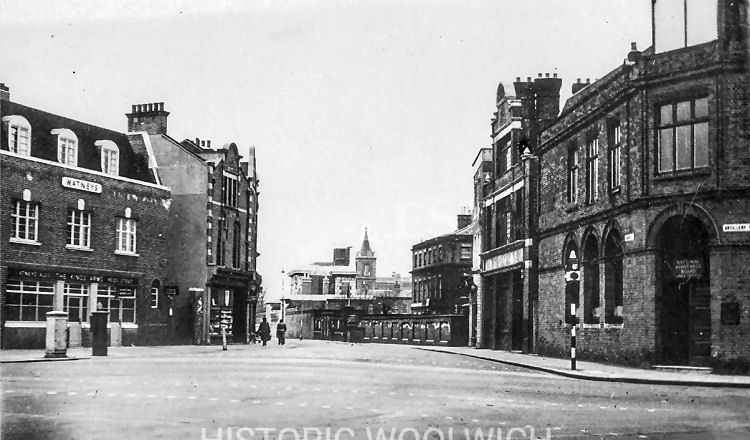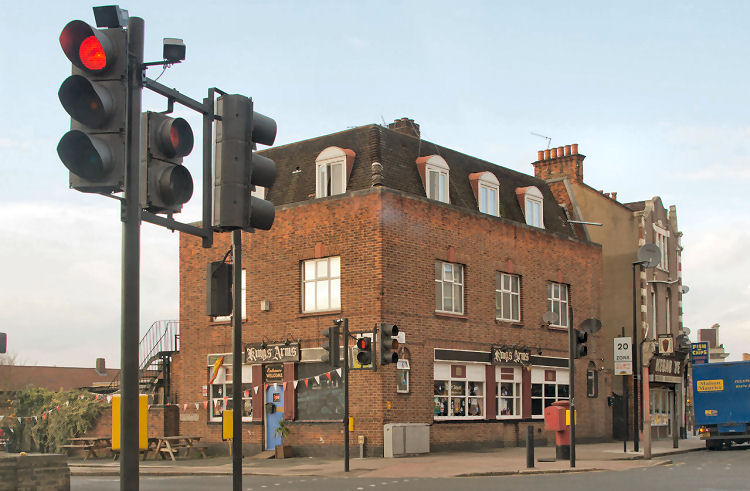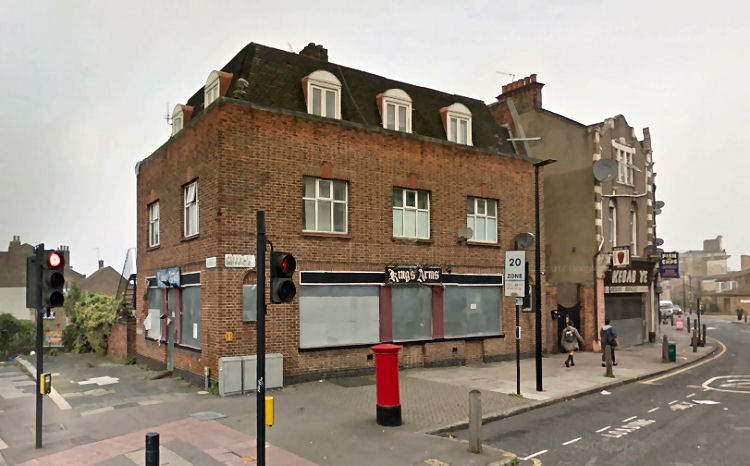|
1 Frances Street (Hill Street 1823 ) )
Woolwich
Pigot's Directory of 1832 called this the "King's Arms Tavern and Royal
Artillery Hotel", with the address of opposite the Artillery Barracks, it
was listed under Inns.
I have just started to map out the pubs
that exist or existed in Woolwich, but need local knowledge and
photographs, old and current if you have any.
As the information is found or sent to me, including photographs, it will
be shown here.
Thanks for your co-operation. Every email is answered and all information
referenced to the supplier.
This page will be updated as soon as further information is found.
|
From the local papers of 1794.
2 Aug:- ... at the "Kings Arms" with
Skinner the Bricklayer....NB ..gave Skinner and Bryant orders to do the
work at the "Kings Arms."
4 Aug:- ... with Captain Humber at "Kings Arms".... NB … Mr Ely and Jaques
stripped and laid open the "Kings Arms" House and damaged the plastering,
without orders, and then left it.
23 Aug:- ... NB Mr Ely’s Lawyer came to me… and read a Bill of something
unto me about Ely.
29 Aug:- .... at Stephen’s (Highlander) with Jaques, Jerry Whitehead,
James Brett, James Gooding, George Highsted and others. ..... At Parish
Meeting "Kings Arms." ... NB Mr Jaques began to paint the "Kings Arms"
House…. and abused me in presence of James Gooding, Jerry Whitehead and
James Brett at my son’s (the Highlander) in the afternoon when I showed
him Mr Tong’s letter and my Estimate.
4 Sept:- ... received the writ copies Ely and James Jaques this morn.
He doesn't go into detail, but Stephen Rouse was a builder/carpenter and
it seem he had been hired to do some repairs at the "Kings Arms," but
there was some sort of disagreement resulting in legal action. He
doesn't mention it again, so presumably it was all resolved.
Cheers,
Wendy James.
|
|
From the Kent Herald, 7 December 1826.
On Friday last, a person, having the appearance of a gentleman, went into the
"Kings Arms Tavern," Woolwich, about two o'clock in the afternoon, with a carpet
bag, bundle, and umbrella, which he left at the bar. He returned about five
o'clock and ordered dinner. After he had finished his with he repast, he
requested to be shown a room where he could wash his hands, he was accordingly
accommodated with one. During the time he remained upstairs, he broke into an
adjoining room, and stole nearly three dozen of silver tablespoons, a valuable
golden silver watch, with gold chains and seals, a quantity of gold and silver
coins, and numerous other portable articles, with which he contrived to escape,
and has not since been heard of.
|
|
From the Borough of Greenwich Free Press, 22 December, 1855.
CORONER'S INQUESTS.
On Tuesday last, the following inquests were held at the "King’s
Arms Tavern," Woolwich, before C. J. Carttar, Esq., Coroner. On the
body of William Chalk, an able seaman on board the Black Eagle
steam vessel. It appeared from the evidence that on the previous
Friday afternoon the deceased fell from the railing of the ship on
to a landing stage and from thence into the water. He was extricated
immediately, but life was extinct, and it appeared that death
resulted from dislocation of the neck. The jury returned a verdict
in accordance with the evidence.
The next case was on the body of a shoe maker, named Frederick
Gregory. It appeared from the evidence of three of the deceased’s
shipmates that they had been drinking at the various public houses
in company with the deceased for several days, and on the previous
Friday night the deceased left a public house for the purpose of
proceeding home. Shortly afterwards his companions left the house,
and found the deceased lying in the road. He was then taken home and
placed in bed, where he was found dead on the following morning. The
jury returned a verdict of died from natural causes, and the coroner
remarked that he hoped this event would be taken as a solemn warning
by the companions of the deceased, and that they would desist from
the destructive vice of drunkenness.
|
|
From the Kentish Gazette, 26 May 1857.
Smashing.
Martin Tway and John Kirk, committed for trial on charges by Police
Serjeant Newell, of uttering counterfeit coins at the "Rose and
Crown," "King's Arms," "Queen’s Arms," and other taverns in
Woolwich, have been sentenced, the former to four, and the latter to
six years penal servitude.
|
|
From the Borough of Greenwich Free Press, 2 May, 1857.
MURDER A OF CORPORAL OF MARINES, AT WOOLWICH.
On Wednesday afternoon, an adjourned inquest was held at the "King’s
Arms Tavern," Woolwich, before C. J. Carttar, Esq., coroner for West
Kent, on the body of Samuel Long, a corporal of the Woolwich
division of Royal Marines, who died at the Marine Infirmary on the
previous Friday night, from a bayonet wound inflicted by a seaman
named George Bave.
From the evidence adduced at this and previous examinations, there
appears to be no doubt that Rave had secreted himself on the main
deck of the Hebe Hulk, and that when the deceased, in accordance
with his duty, went over the vessel at nine o’clock to see that all
lights were out, the prisoner who had previously possessed himself
of a bayonet, suddenly sprang upon his victim, and committed the
crime.
Several witnesses including Charles Blofield, a boat-swain, and John
Newberry, a marine, proved that, after the act was committed, Bave
paced the deck with the bayonet, and asserted that he had had his
wish, and that he did not care if he was hanged for it.
Dr. Evans, medical inspector of the Royal Marine Infirmary, now
stated the result of the put mortem examination. It appeared that
the bayonet had entered the body immediately below the short ribs on
the right side, passing downwards, completely to the spinal bone,
which alone prevented the point of the weapon from finding egress on
the opposite side. The witness said it was perfectly wonderful that
any man could exist twenty-four hours after receiving such a wound.
The coroner carefully summed up the evidence, pointing out the legal
distinction between manslaughter and murder, and the jury, after a
short consultation, returned a verdict of "Wilful Murder," against
George Bave.
|
|
From the Borough of Greenwich Free Press, 28 November, 1857.
Death of a Wealthy Miser from want of the Common Necessaries of
Life.
An inquest was held on Thursday, at the "King's Arms," Woolwich,
before C. J Carttar, Esq., Coroner for West Kent, on view of the
body of Thomas Rust, aged 51 years. The deceased was a single man,
of very eccentric habits, and resided for some years without
society, at a small house in Lower Market-street, Woolwich. The jury
retained the following verdict. That death resulted from natural
causes, and was accelerated by a want of medical attendance and the
common necessities of life."
|
|
From the Maidstone Telegraph, Rochester and Chatham Gazette, 19 October 1861.
Fatal Accident.
On Tuesday Mr. Serjeant Payne held inquiry, in St Thomas's Hospital, on
the body of John Taylor, age 48 years, a livery stable keeper, of the
"King's Arms," Woolwich.
Mr. William Cocking, grocer, of No. 7, Francis
Street, Woolwich, said that, on the 9th of the present month, a few
minutes after 8 o'clock, he was driving in a gig, and the deceased was
sitting at his side. They had preceded about halfway along the road
towards the "Royal Standard" at Woolwich, when, the night being dark, a
collision took place between the gig, he and deceased were in a cart.
The consequences were that deceased and witness were pitched out into
the road. Witness, assisted deceased up, and he was seen by Dr. Finch,
and afterwards admitted into the hospital, in which institution he died
on the 12th. Neither the gig nor cart were overturned, but deceased and
witness were thrown out about seven feet from the footpath, on the near
side.
|
|
Orr's Kentish Journal, 15 February 1862.
James Pelan, 42, pensioner, Miller's-buildings, Artillery-place,
wilfully breaking a square of glass, value 10s., the property of Mr.
James Waterman, 14, Artillery-place; also a square of glass, value
35s., at the house of Mr. Blest, "King's Arms Hotel,"
Francis-street,
Woolwich, 45s. or 2 months.
|
|
From ‘Kentish Independent’ 8 June 1895.
DISCOVERY OF OLD OIL PAINTINGS.
Can anyone help us discover the identity of a capable artist by the name
of Robinson, who was much in evidence at Woolwich about the year 1784?
A
very extensive and elaborate series of paintings executed by him on the
walls of a room at the "King’s Arms Hotel" has just been brought to light
by the Proprietor, Mr. Campbell, who, in order to repaper the room, had
all the old papers, some six in number, stripped off.
The paint, when
disclosed, was nearly black everywhere, but, by the advice of Mr. J. O.
Cook, architect, Mr. Purnell, of Conduit Road, a well-known expert, was
called in and undertook the work of restoration. He found that the
pictures had been covered with seven coats of varnish, the whole of
which he cleaned off – enough to fill a bushel basket – and the
pictures, perfectly revived, are now resplendent in all their original
glory.
They are painted in oil colours upon the plaster of the walls and
cover them in every part. There are but two subjects, one being a view
of the Bay of Naples and the other a Scotch pastoral subject, neither of
which, of course, gives any clue to the authorship.
One of the
paintings, however, bears the signature of “Robinson,” with a date which
is either 1783 or 1785. In 1783, the first mess-room in the Royal
Artillery Barracks (now the theatre), was being built, and there is
reason to believe that some of the officers had their mess at the "King’s
Arms Hotel." (“Records of Woolwich,” pp. 386-7) That being so, the
inference would be that one of them was the artist. But there was not
one of them named Robinson in 1783 or 1785. There was one on the retired
list, but it would be a stretch of imagination to associate him with the
work; and there was a Lieutenant Robison promoted to the rank of captain
about the date in question, but if the signature is “Robinson,” Robison
will not do.
The discovery, however, is interesting, even without the
artist’s revelation, and the character of the work, though it may not
rank as genius, is good enough to make us marvel that any one of the
hosts of the "King’s Arms" could have had the heart to cover it with wall
paper. Probably, however, it grew indistinct under the load of varnish,
and nobody thought of restoration. There is no doubt that it had been
hidden from mortal eye for at least sixty or eighty years.
|
|
Belfast Telegraph, Tuesday 16 September 1975.
Pub Bombingsd were Carefully Planned.
THE BOMB attacks on two Guildford pubs, and another at Woolwich, which,
killed seven people and seriously injured 84 were carefully planned with
advance information by an IRA raiding party, an Old Bailey jury was told
to-day.
The prosecution was opening its case against three Irishmen and a
teenage London girl accused of five murders, among 11 charges.
The trial, expected to last at least two months, opened amid some of the
most massive security seen at the Central Criminal Court. including
police marksmen posted on nearby rooftops.
Sir Michael Havers, QC, prosecuting, said the bombing at the "King's
Arms," Woolwich, was carried out without any sort of advance warning and
the Guildford explosions at the "Horse and Groom" and the "Seven Stars"
were caused by "two timed bombs."
All four defendants were part of a "raiding party" on Guildford, said
Sir Michael.
The raids were carefully planned with "photographic
reconnaissance in
advance." Intelligence about the use of particular public houses was
also obtained in advance.
The accused, who pleaded not guilty to all charges, were Carole
Richardson (17), of Earls Court Square, Earls Court, London; Paul Hill
(29), of Barnsley Crescent, Belfast; Gerard Conlon (20), of Cypress
Street, Belfast, and Patrick Armstrong (24), of Algernon Road, Maida
Vale, London.
Armstrong and Hill alone are accused of murdering a sales clerk and a
soldier at the Woolwich pub last November.
The five young people who died in the blast last October at the "Horse
and Groom" public house, Guildford were two WRAC girls, two Scots Guards
recruits and a civilian youth.
Sir Michael said a number of courting couples were in the "Horse and
Groom" that night, including Armstrong and Carole Richardson. The pair
were acting like a courting couple but were, in fact, hiding their bomb
under one of the seats running round the pub alcove, he said.
The trial is before Mr. Justice Donaldson, former president of the
scrapped Industrial Relations Court. Sir Michael Havers. QC, and the
Treasury counsel, Mr. Michael Hill, are conducting the Crown's case.
There was an outburst in the dock from one of the accused moments after
the four were taken into court and arraigned on 11 charges.
In the absence of the jury, Paul Hill refused to plead to any of the
charges against him and repeated several times: "Your justice, stinks."
Mr. Leslie Boyd, the court's chief administrator who was reading the
charges, paused and asked Hill: "What did you say?" Hill again said:
"Your justice stinks."
Mr. Justice Donaldson, presiding at his first trial at the Old Bailey,
told Mr. Boyd to carry on.
Hill, wearing an open-necked shirt and a long-sleeved black pullover,
stood arms folded.
After the first two charges. Hill remained silent then asked to plead to
the remainder.
Sir Michael Hayers. QC, leading for the Crown, said he was a little
concerned about Hill's silence and referred the judge to court
procedural rulings in which it was laid down that a jury would have to
be specially empanelled to decide whether or not Hill's silence was due
to malice or some other reason.
At this point there was a hurried discussion between Hill and his legal
advisers and then defence counsel announced that he had just been
instructed that Hill wished to plead "Not guilty" to all charges.
The trial jury was then empanelled.
The four were also charged with unlawfully and maliciously causing by
explosive substance an explosion at the "Seven Stars" public house in
Guildford on the same date, of a nature likely to endanger life or cause
serious injury to property.
Armstrong alone was accused of conspiring with Paul Michael Hill, and
others unknown between October 5 and November 8, 1974. to murder persons
at or in the vicinity of the "King's Arms" public house, Woolwich; and
that between October 5 and November 8. 1974, he unlawfully and
maliciously assisted in a reconnaissance of the "King's Arms," Woolwich,
with intent to cause explosions at the pub, likely to endanger life and
cause serious injury to property.
Armstrong and Hill were further accused of murdering sales clerk Alan
Horsley and soldier Richard Sloane Dunn who died in an explosion at the
"King's Arms" on November 7. |
LICENSEE LIST
JAMES Jb A 1823+

JAMES Jacon 1832-May/48

BLEST Alexander Melville May/1848-74
HARROD Edward 1881+ (proprietor age 40 in 1881 ) )
BOWLES Harriet Mrs 1882+
CAMPBELL G H 1895-96+
WEBBIN Walter 1901-05+ (manager age 29 in 1901 ) )
WORDSWORTH Alfred 1901-05+
WORDSWORTH Richard 1908+
MACKENZIE Gilbert 1911-19+
HERWIN William R 1921+
MORGAN Robert 1934-44+
https://pubwiki.co.uk/KingsArms.shtml
 From the Pigot's Directory 1823 From the Pigot's Directory 1823
 From
the Pigot's Directory 1832-33-34 From
the Pigot's Directory 1832-33-34
 Census Census
|


